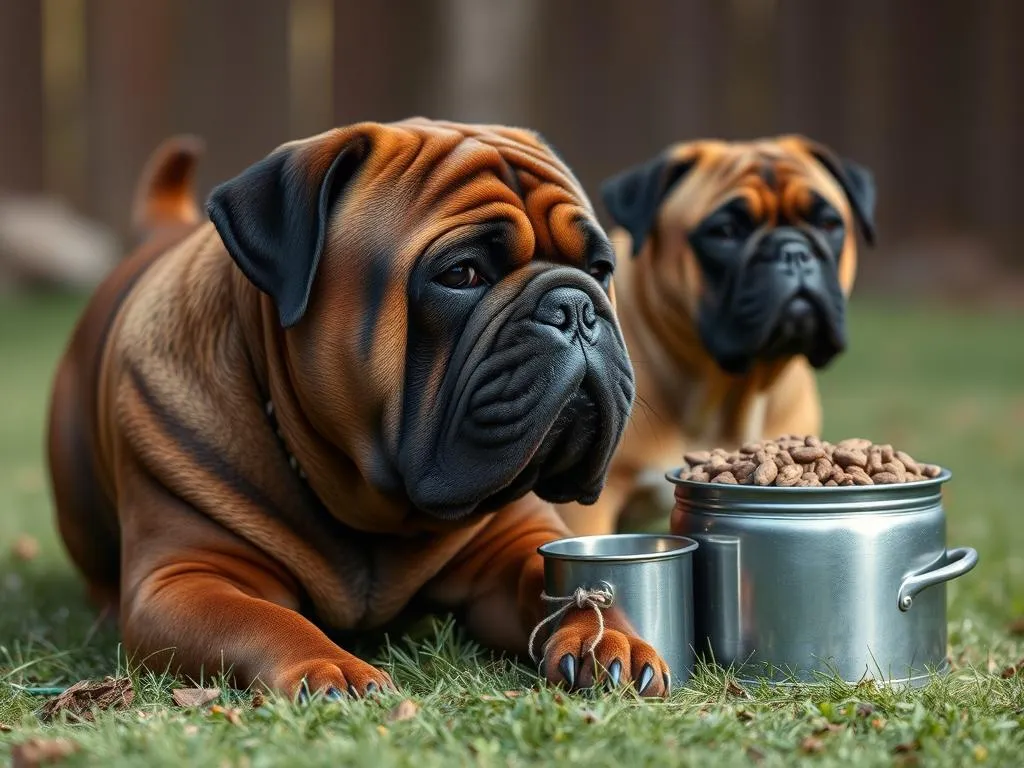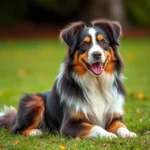
Introduction
Bullmastiffs are a majestic breed characterized by their impressive size and gentle temperament. Typically weighing between 100 to 130 pounds, these dogs are known for their loyalty, making them excellent family companions and protectors. Despite their intimidating stature, Bullmastiffs are affectionate and good-natured, thriving in environments where they can be part of the family. However, their size predisposes them to certain health issues, such as hip dysplasia and obesity, making nutrition a critical aspect of their care.
Proper nutrition is essential for maintaining a Bullmastiff’s health, energy levels, and longevity. With the right diet, owners can help prevent common health issues and ensure their dogs live a long, healthy life. This article aims to provide guidance on selecting the best dog foods for Bullmastiffs, ensuring that these gentle giants receive the nutrients they need.
Understanding Bullmastiff Nutritional Needs
Key Nutritional Components
When selecting the best dog foods for Bullmastiffs, it’s crucial to understand their unique nutritional needs.
-
Proteins: High-quality proteins are vital for muscle development and overall health. Bullmastiffs require a protein-rich diet to support their large frames and maintain muscle mass. Look for dog foods that list meat as the first ingredient, such as chicken, beef, or fish.
-
Fats: Healthy fats play a significant role in providing energy, supporting skin and coat health, and promoting overall well-being. Omega-3 and Omega-6 fatty acids, found in fish oil and flaxseed, are particularly beneficial for Bullmastiffs.
-
Carbohydrates: While dogs do not require carbohydrates in the same way humans do, digestible carbs and fiber can aid in digestion. Ingredients like sweet potatoes and brown rice are excellent sources of energy and help keep your Bullmastiff’s digestive system healthy.
-
Vitamins and Minerals: Essential vitamins and minerals are crucial for overall health. Look for dog foods fortified with vitamins A, D, E, and B-complex, as well as minerals like calcium and phosphorus to support bone health.
Special Considerations for Bullmastiffs
Bullmastiffs have specific nutritional needs at different life stages, and attention to their diet can help manage these needs effectively.
-
Growth Stages: Puppies require a diet that supports rapid growth and development. Foods formulated for large breed puppies are ideal, as they contain the right balance of nutrients to support healthy bone and joint development. Adult Bullmastiffs should transition to a maintenance diet, while senior dogs may require specialized formulas that support joint health and weight management.
-
Weight Management: Due to their predisposition to obesity, it’s essential to monitor your Bullmastiff’s weight and adjust their diet accordingly. Choose foods that are lower in calories but still rich in nutrients to help maintain a healthy weight.
-
Joint Health: Large breeds like Bullmastiffs are prone to joint issues. Nutrients such as glucosamine and chondroitin can support joint health, making it important to include them in their diet.
Common Health Issues in Bullmastiffs
Overview of Common Health Concerns
Bullmastiffs are susceptible to several health issues that can be influenced by diet.
-
Hip Dysplasia: This genetic condition affects the hip joint’s development and can lead to arthritis. Feeding a balanced diet rich in essential fatty acids and glucosamine can help maintain joint health and manage symptoms.
-
Bloat (Gastric Dilatation Volvulus): Bullmastiffs are at risk for bloat, a life-threatening condition characterized by a swollen stomach. Feeding smaller, more frequent meals and avoiding vigorous exercise right after eating can help reduce the risk. Some dog foods are specifically designed to minimize this risk.
-
Skin Allergies: Many Bullmastiffs suffer from skin allergies, which can be exacerbated by certain ingredients in their food. Hypoallergenic diets that eliminate common allergens can be beneficial in managing these conditions.
Role of Nutrition in Disease Prevention
Proper nutrition plays a crucial role in preventing many health issues common in Bullmastiffs.
-
Supplementation: Consider supplements containing Omega-3 fatty acids, glucosamine, and probiotics to support joint health and digestive function. Always consult with a veterinarian before adding supplements to your Bullmastiff’s diet.
-
Dietary Adjustments: Based on specific health concerns, dietary modifications may be necessary. For example, dogs with skin allergies might benefit from grain-free diets or those containing novel protein sources like duck or venison.
Choosing the Right Dog Food
Types of Dog Food
Selecting the right type of dog food is vital for Bullmastiff owners.
-
Dry Dog Food (Kibble): Kibble is convenient and helps maintain dental health by reducing tartar buildup. However, ensure that the kibble is made with high-quality ingredients and is specifically formulated for large breeds.
-
Wet Dog Food (Canned): Canned food can be more palatable and provides additional moisture, which is beneficial for hydration. However, it can be more expensive and may not provide the same dental benefits as kibble.
-
Raw Diets: Raw feeding has gained popularity, but it requires careful planning to ensure nutritional balance and safety. Potential risks include bacterial contamination and imbalanced nutrition, so consult with a veterinarian if considering this option.
-
Homemade Diets: Preparing homemade meals allows owners to control ingredients but requires careful planning to meet all nutritional needs. Consultation with a veterinary nutritionist is recommended to create balanced recipes.
Reading Dog Food Labels
Understanding dog food labels is essential for making informed choices.
-
Understanding Ingredients: Look for foods that list real meat as the first ingredient, avoiding those with vague terms like “meat by-products.” High-quality carbohydrates and vegetables should also be included.
-
Nutritional Analysis: The Guaranteed Analysis on dog food labels provides information on protein, fat, and fiber content. For Bullmastiffs, look for a protein content of at least 20-30% and fat content around 8-15%.
Top Recommended Dog Foods for Bullmastiffs
Criteria for Selection
Selecting the best dog foods for Bullmastiffs involves considering several factors.
-
Quality of Ingredients: The best dog foods are made with whole foods and named meat sources. Avoid foods with fillers, artificial preservatives, and excessive amounts of grains.
-
Nutritional Balance: Ensure the food has a proper balance of protein, fat, and carbohydrates suited for Bullmastiffs. Large breed formulas are often designed with this balance in mind.
-
Brand Reputation: Choose reputable brands known for their commitment to quality and transparency in sourcing ingredients.
Reviews of the Best Dog Foods
Here are some of the top-recommended dog foods for Bullmastiffs:
- Brand A: Royal Canin Bullmastiff Adult
- Nutritional Profile: Formulated specifically for Bullmastiffs, this kibble helps maintain a healthy weight and supports joint health.
- Benefits: Contains optimal protein levels and essential fatty acids for skin health.
-
User Reviews: Highly rated for palatability and digestibility.
-
Brand B: Hill’s Science Diet Large Breed Adult
- Nutritional Profile: Offers a balanced diet with high-quality protein and omega-6 fatty acids.
- Benefits: Supports lean muscle and joint health while promoting healthy skin and coat.
-
User Reviews: Positive feedback on improved coat condition and energy levels.
-
Brand C: Orijen Original Dry Dog Food
- Nutritional Profile: Rich in protein with fresh, regional ingredients and no grains.
- Benefits: Supports muscle mass and healthy weight management.
-
User Reviews: Customers report improved overall health and vitality.
-
Brand D: Blue Buffalo Life Protection Large Breed
- Nutritional Profile: Features real meat, whole grains, and a blend of antioxidants.
- Benefits: Supports immune health and promotes healthy muscle development.
-
User Reviews: Praised for its natural ingredients and positive effects on digestion.
-
Brand E: Nutro Ultra Grain-Free Large Breed
- Nutritional Profile: Grain-free formula with a blend of proteins from chicken, lamb, and salmon.
- Benefits: Promotes lean muscle mass and supports healthy skin and coat.
- User Reviews: Owners appreciate the high-quality ingredients and noticeable health benefits.
Feeding Guidelines for Bullmastiffs
Portion Sizes
Determining the right portion sizes is crucial for Bullmastiffs.
-
Puppies vs. Adults: Puppy Bullmastiffs require more frequent meals, typically three to four times a day, to support their rapid growth. Adult Bullmastiffs generally benefit from two meals a day, with portion sizes adjusted based on weight and activity level.
-
Adjusting Portions: Monitor your dog’s body condition score to determine if adjustments are needed. Active dogs may require more calories, while less active dogs should have their portions reduced to maintain a healthy weight.
Feeding Schedule
Establishing a consistent feeding schedule helps maintain a Bullmastiff’s health.
-
Frequency of Meals: For puppies, feeding three to four times daily is recommended, while adults should ideally be fed twice a day. This helps prevent bloat and ensures steady energy levels.
-
Transitioning Foods: When switching to a new dog food, do so gradually over a week to avoid digestive upset. Start by mixing a small amount of the new food with the current food, gradually increasing the new food’s proportion.
Additional Tips for Bullmastiff Owners
Monitoring Your Dog’s Health
Owners should regularly monitor their Bullmastiff’s health and nutrition.
-
Signs of Good Nutrition: A healthy Bullmastiff should have a shiny coat, clear eyes, and a healthy weight. Regular stool quality is also an indicator of proper nutrition.
-
Regular Vet Check-ups: Regular veterinary visits are essential for monitoring health and making dietary adjustments as needed. Your vet can provide personalized recommendations based on your Bullmastiff’s specific needs.
Hydration
Hydration is a key element of a Bullmastiff’s overall health.
- Water Needs: Ensure your Bullmastiff has access to fresh, clean water at all times. Adequate hydration is vital for digestion, kidney function, and overall health.
Conclusion
Choosing the best dog foods for Bullmastiffs is crucial for their health and well-being. By understanding their unique nutritional needs, common health issues, and the importance of high-quality ingredients, owners can help their Bullmastiffs thrive. Regular monitoring of health and consulting with veterinarians for personalized dietary recommendations can further enhance their quality of life. Investing in the right nutrition will ensure that these gentle giants live long, healthy, and happy lives.









